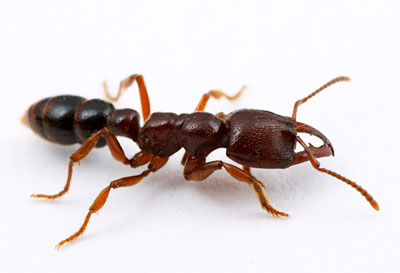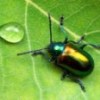
Amblyopone australis
The correct pronunciation of this ant's name is Am-blee-ah-pon-ee, with the emphasis on the antepenultimate syllable and the final "e" audible. But I don't know anyone who says it that way.
Every English-speaking myrmecologist I know calls it "Am-blee-oh-pohn", with the final "e" silent. That's a shame, because the right way is also prettier. I mentioned this to May Berenbaum- whose office is across the hall from mine- and she pointed out that midwesterners inflict the same error on calzones, which New Yorkers say correctly as "cal-zon-ee."

I have tried to get myself to pronounce biological Latin names roughly as though they were Italian or even some approximation of classical Latin, and tend to be pretty consistent at this when I'm in the company of those for whom English is a second language.
But it's quite difficult to keep this up when speaking to English-as-first-language speakers or, as it turns out, thoroughly bilingual biologists from South Asia, who try to apply the complicated rules, and all possible exceptions, for English vowels to these latinate words.
I try to strike a balance. Some basic rules - such as no silent vowels - are easy (as long as you know about dipthongs). Others regarding accent on the penult or antepenult are a little harder, what with all the exceptions, but mostly they are doable. The biggest problem for me and my mostly English-as-a-first-language colleagues is latinized long vowel sounds (AYE versus AH for 'a', EE verses EYE for 'i', etc.). But then, I probably worry too much about this to begin with.
Actually, I kinda like "am-blee-oh-POHN-ee" - evoking an image of a small horse in no hurry ;-)
I've no idea how to say any of the names so I've been pronouncing Amblyopone as Am-bleh-Pony
I've never heard anyone say cal-zon-ee.
Dear English-speaking biologist,
I, as non-English biologist, have a need to remind you this: Latin names of living world are on LATIN. So it should be read like Latin. It may be dead language (well, not, according to Vatican..) but the point of Latin nomenclature is that we could UNDERSTAND each other, no matter what language do we speak. And the truth is that I really have hard time trying to understand English versions of Latin names, and I know I'm not the only one.
So, dear James, I know it is hard and unnatural for you, but still, just keep on trying. I learned a whole language- English- so I can get along with the world, and you were practical born with that knowledge. You lucky guys could at least try and work on your Latin.
I am very sorry that my first comment on your blog is so critical, Alex. I am your regular reader and I find your posts, views, pictures and sophisticated humor truly brilliant. But this subject is bugging me for a while, so I just couldn't resist.
Greetings from Croatia (where we speak Croatian language)
Thanks for stopping by the blog, Ana!
It's a shame that James wasn't one of the instructors this year for ant course (as he usually is). Of all the North American myrmecologists I know he is the most likely to attempt the correct grammar and pronunciation of the Latin.
Yeah, I should have gone. It would have been good preparation, after 15 years away from the Neotropics, for my January, two-week trip to Ecuador. I'm going to miss it again this year, since my son will graduate with his Ph.D. during the week-plus of this summer's Arizona session.
I hope my absence won't stop anyone from applying, heh, heh.
Anyway, thanks. It's true, I do love the Latin!